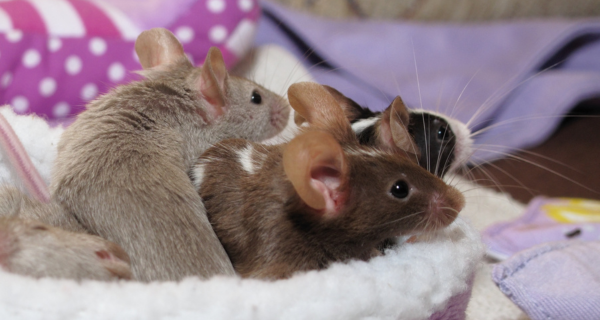

The hidden lives of rats and mice:
Highly intelligent rodents, rats and mice are natural students who excel at learning and understanding concepts.
Rats are considerably smaller than dogs but are at least as capable of thinking about things and figuring them out! And, while rats are much smaller than elephants, they have excellent memories. Although their eyesight is poor, once rats learn a navigation route, they never forget it.

Both mice and rats are also highly sociable animals. They become attached to each other, love their own families, and easily bond with their human guardians, returning as much affection as is given to them.
Many rats will even “groom” their human companion’s hand and would appreciate a massage, a scratch behind the ears, or even a tickle in return. Recent studies by Jaak Panksepp, a neuroscientist at Bowling Green State University, suggest that when rats play or are playfully tickled, they make chirping sounds that are strikingly similar to human laughter. The rats he studied also bonded socially with the human tickler and even sought to be tickled more.
Panksepp corroborates what rat lovers have known all along: “Young rats have a marvelous sense of fun.”
Male rats will snuggle up for a cuddle and find contentment curled up in a person’s lap. Although female rats are just as affectionate, they tend to be tremendously energetic and inquisitive. Rats love seeing kind people and will often bounce around waiting to be noticed and picked up. Rats can bond with their human companions to the point that if they are suddenly given away to someone else or forgotten, they can pine to death.
Studies reveal that rats express empathy when another rat or a human they know is in pain. People who share their lives with rats report that they are altruistic beings who will try to help in times of distress.

The Problem Of Hair Loss In Mice:
Information provided by Michelle Marquardt - BVSc (Hons) MRCVS for The Pet Directory
Skin problems are the most common medical condition seen in mice. They have a variety of different causes, some easily treatable, some less so. Here’s a basic guide to the things that can happen to your mouse’s skin.

Barbering
This is seen in groups of mice housed together, and is more likely to occur in groups of females. The dominant mouse in the group chews all the whiskers and hair from the muzzles and around the eyes of its cagemates. The dominant mouse is easy to pick because it’s often the only one with all its fur. Removal of this mouse will help the problem for a while, but often one of its former victims takes its place and the cycle starts again.
Mechanical Abrasion
Fur can be rubbed off and skin damaged by ongoing contact with feeders, watering devices or other fixtures in the cage. Hair loss is usually on the sides of the muzzle. If you’ve got a lone mouse who’s chewing the bars or exhibiting repetitive behaviour, enrich their environment with toys and a running wheel.
Mites
Mice can carry three types of fur mites. They cause generalised hair thinning (especially on the head and trunk), itching and sometimes skin greasiness. Your vet can confirm the diagnosis and administer appropriate treatment.
Other Skin Conditions
Rarer skin complaints include fungal infections, tumours and ulceration of unknown cause. These can be more complicated to diagnose and treat than the conditions listed above, so talk to your local vet about the options.

Rats And Respiratory Disease:
Rats make great pets; they’re intelligent, social and very rewarding to keep. But, like any animal, they can develop health problems which require prompt veterinary attention to avoid serious illness.

In our practice, the most common problem we see in rats is respiratory disease. This is usually in the form of chronic respiratory disease or acute pneumonia. Affected rats may snuffle and sneeze, make noise as they breathe, lose weight and secrete red porphyrins from their eyes and nose (a general sign of stress). Some rats can become very ill very quickly.
Infections can involve both bacteria and viruses, often together. Viruses don’t respond to antibiotics, and the most commonly involved bacterium, Mycoplasma pneumonae, is often not eliminated despite long courses of medication. Despite this, most rats respond well to a combination of antibiotics. A visit to your vet for a checkup and possibly medication is vital if your rat is showing any of the signs listed above.
A lot of apparently healthy rats are carriers of the bacteria and viruses that cause respiratory problems, and rats who have recovered post antibiotics are always at risk of relapsing. The best thing you can do to ensure your rats stay healthy is to minimise the sorts of stresses that help the disease to take hold in the first place.
• Ensure good air quality. Ammonia buildup in cages is a big factor in respiratory disease. Change bedding (including that in nests) at least twice a week and ensure the cage is well ventilated. Avoid overcrowding.
• Feed a balanced diet. Respiratory problems have been linked to deficiencies in vitamin A and E and a rat who’s run down due to poor diet is at risk from all types of disease. A good quality rat cube should contain everything your rat needs (protein levels in the cubes should be 20-27%). This can be supplemented by occasional healthy treats such as vegetables and some nuts and seeds, but don’t overdo it. Avoid mixes; rats tend to pick out the tasty bits and leave the rest.
• Avoid obesity. Overweight rats are more prone to disease and have more trouble recovering once they become ill.
• Watch for red tears or nasal secretions. These are a sign that your rats are stressed. If you’re seeing them, look for the reason why.
As a general rule, if you’re worried talk to your vet; good management and early intervention are the keys to maintaining your rats in good health.

Interview with Tracey York, Ratpack & Ratmandu Rattery & AusRFS President and The Pet Directory
Meet Tracey York, Ratpack & Ratmandu Rattery & AusRFS President

• Do many people keep pet rats in Queensland?
Yes, they are a very popular pet here. I suspect it’s because we arent able to have rabbits or ferrets like other states do. Our rat and mouse club branch is the largest in Australia.

• Is it an expensive hobby?
By the time you allow for possible vet fees, as well as food, toys, housing etc. they aren’t a $5 pocket pet. They can be rather expenisve, but like any animal, if you purchase from a reputable breeder and get rats from healthy, long lived lines, you lessen the chance of purchasing a sickly animal.

• Are rats smelly, dirty and carry diseases?
NO, certainly not, they are one of the cleanest animals you can have. Rats are meticulous groomers.
Rats/mice only smell if their home isnt clean, just like any other animal. Rats do not carry the plague as is commonly thought. Fancy rats are not like wild rats, its like comparing a dog and a dingo, they are completely different.

• Is it difficult to successfully keep rats as pets?
No, rats are very easy to keep. It’s best to do some research into whether they would be a suitable pet for you before purchasing. They require less space than a larger pet, but have a lot of personality in that small body!

• What are the main difficulties in breeding rats?
The difficulties encountered are people not planning properly before embarking on breeding. Not enough planning and careful selection goes into it. You need to select carefully your breeding pairs in order to get the best possible result you can. Through our Society we try and educate people in proper preparation and planning, and also care of their rats/mice.
• Is breeding rats to show them becoming popular?
Yes it is, but most people who show rats/mice are pet owners only, not breeders.

• Where are rat shows held?
We hold our shows at a Community hall, The Finnish Hall, 62 Newnham Road, Mt Gravatt. Shows are held every 8 weeks and are a day event, starting around 9-30am and finishing around 3-30pm.
• What types of prizes do people win at a rat show?
People can win large ribbons/sashes or trophies. Points are allocated for breed classes and these points accumulate for Championship status, the end result of the most points accrued being Rat/Mouse of the Year trophy.

The Pet Directory is the proud sponsor of championship trophies at AusRFS Rat & Mouse Shows for 2004


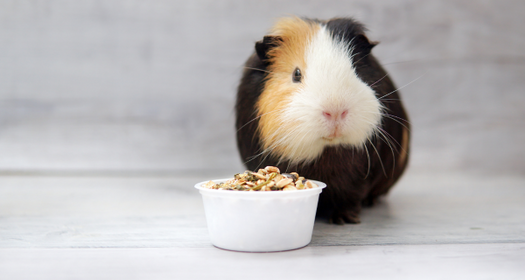
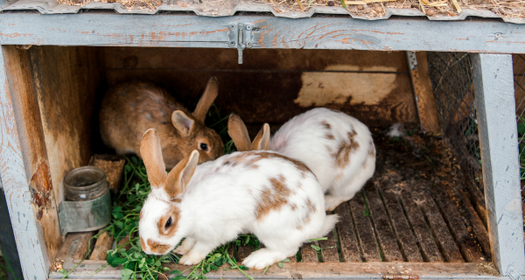
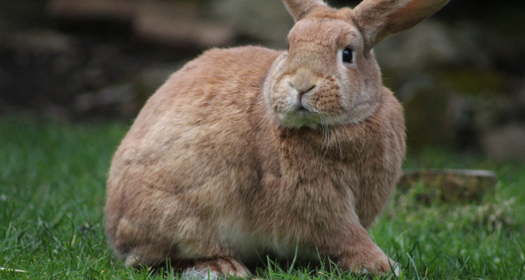
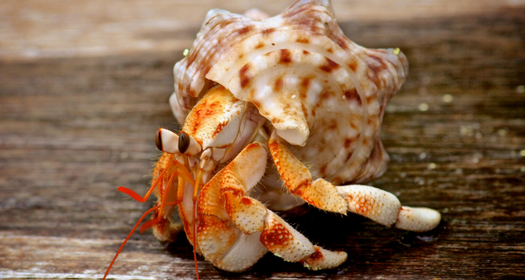
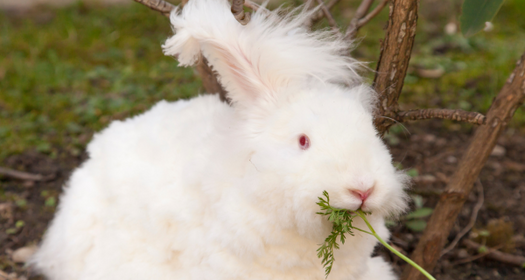




Leave Comment Below